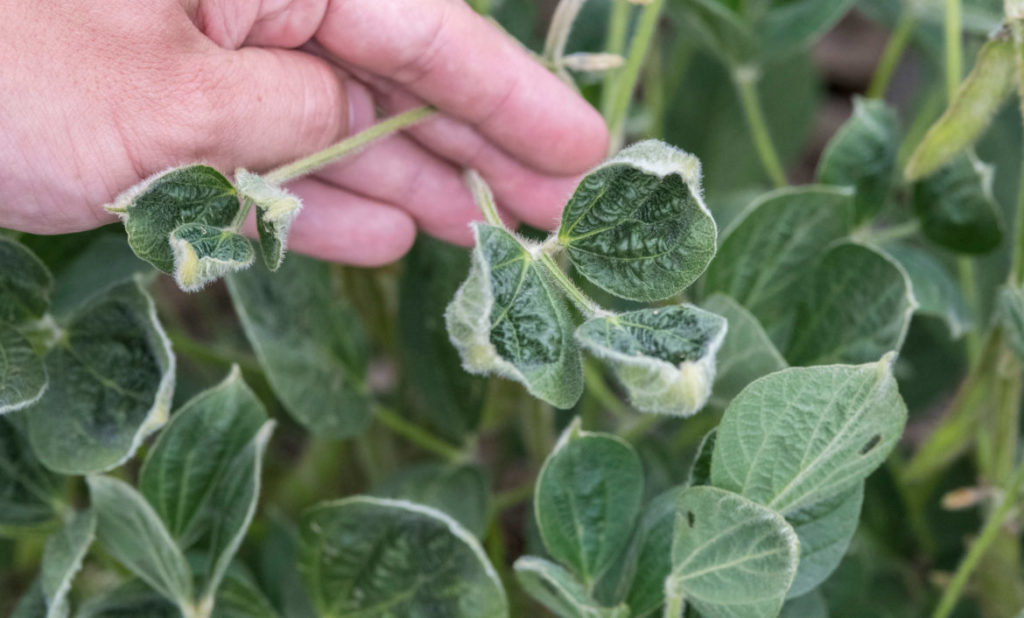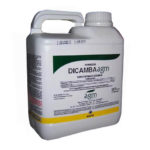Approved by Obama and Trump, Dicamba Drifts to Damage Soybeans, Peaches, Other Crops; In Court, Farmers Win a Round Against Manufacturer
Problems with dicamba, the herbicide that tricks weeds into growing so fast they die, were found more than 50 years ago. But the EPA under Obama approved new dicamba sprays in 2016 without independent testing of how prone the herbicide was to drift to damage other fields.
A jury deliberated just 30 minutes on Feb. 15 in a Southeast Missouri courthouse named after Rush Limbaugh’s grandfather before deciding on $250 million in punitive damages for the makers of the herbicide, Monsanto and BASF. The case was brought by an owner of a peach orchard. The companies were also ordered to pay $15 million in compensation.
Trump met with CEO Werner Baumann of Bayer, the German company that now owns Monsanto, soon after his election. Trump’s EPA kept dicamba on the market. Concentrations in the air in Missouri’s Bootheel and Arkansas’s Delta have been compared to smog. The dicamba products’ EPA approval is set to expire Dec. 20 unless the agency extends it again.
So many farmers were spraying dicamba that a dicamba smog would build up, often poisoning crops for an entire night.
“EPA understands that dicamba is a valuable pest control tool for America’s farmers,” Andrew Wheeler, then the EPA acting administrator, said in 2018.
Dicamba can damage soybeans that aren’t treated to resist it at concentrations in the air as low as one billionth of a gram per cubic meter. One tell-tale sign of damage in soybeans is “cupping” where necrosis on the leaf tip makes the leaf cup up. Peach trees like the ones on Bill and Denise Bader’s peach orchard spread over more than 1,000 acres near Campbell, Mo., are also ultra-sensitive to dicamba.
ACTION BOX/What You Can Do About It
Tell EPA Administrator Andrew Wheeler your thoughts on dicamba. Call Wheeler at 202-564-4700 or write to him at EPA Headquarters / William Jefferson Clinton Building / 1200 Pennsylvania Ave., NW / Mail Code: 1101A / Washington, D.C. 20460.
Contact the Center for Food Safety at [email protected] or at one of its offices.
Steve Smith of Red Gold, the world’s largest privately held tomato canner, warned Congress in 2010 that widespread use of dicamba is “incompatible with Midwestern agriculture.”
Environmental groups including the National Family Farm Coalition and the Center for Food Safety sued the EPA and Monsanto in federal court in 2017. They claimed the EPA failed to analyze costs to farmers from drifting dicamba, “recklessly pushing to market” a product that damaged millions of acres of crops.
No Study of Drift
Monsanto denied requests by university researchers before the EPA approved the herbicide to study how likely it was to vaporize and drift across fields.
A three-judge panel for the Ninth Circuit Court of Appeals dismissed the lawsuit in January 2019, saying the case was moot because the EPA had extended the registration for the dicamba spray.
Bader Farms, the Missouri company that sued Monsanto and BASF, is the largest peach farm in Missouri with nearly 110,000 peach trees but puny compared with Monsanto and BASF. The farm is expected to go out of business because of damage from dicamba.
Bader’s legal team asked for $200 million in punitive damages or 2.5% of Monsanto’s net worth. The company put that figure at $6.5 billion in 2017 and $7.8 billion in 2018.
Decimated Peach Crop
The three-week trial focused the damage to the Bader business which the couple started in 1987. Their peach harvest dropped from an average of 162,000 bushels in the early 2000s to as low as 12,000 bushels in 2018.
Weed scientist Ford Baldwin said so many farmers were spraying dicamba that a dicamba smog would build up, often poisoning crops for an entire night. In 2017, 80% of the cotton and 65% of the soybeans in the Bootheel were planted using Xtend seed from Monsanto and nearly all of it was sprayed with dicamba.
Bayer and BASF contended that illegal spraying by farmers, inclement weather and soil fungus damaged the peach trees.
Bayer and BASF have said they plan to appeal the verdict. The lawsuit was the first of at least 140 similar cases to go to trial.
Featured image: Soybeans with suspected dicamba damage. (Darrell Hoemann/The Midwest Center for Investigative Reporting)
PLEASE CONSIDER DONATING TO SUPPORT OUR NONPROFIT NEWS REPORTING EFFORTS






